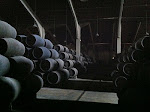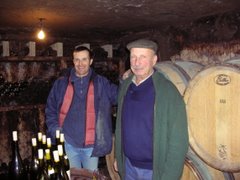More Thoughts on Quality.
First class seats on an airplane are better than the seats in coach. There is no question that this is true. They are more comfortable to sit in, they offer more space, they come with better food and drink, and also with the privilege of getting on and off of the plane before everyone else. They are the best seat on an airplane. They also cost a lot more than any other seat. Whether or not they are worth the expense is a decision that is our own, made according to our own individual calculus. That we have this decision and can opt not to buy first class seats does not imply, though, that there is some question about whether first class are best.
Wine is like this too - some are better than others. But it's much more complicated of a thing to appreciate this in wine and I think that there are three major reasons for this:
1) It's easy to for anyone, even a person who has never been on an airplane before, to understand why first class seats are better. Appreciating why one wine is better than another wine is not as straightforward.
2) We develop personal preferences, we find styles of wine that we like, prefer one kind of wine over another. It is easy and self-serving, even, especially as we gather more wine drinking experience, to assume that our personal preferences are in line with an objective truth about quality.
3) We get confused by price. We buy coach seats when we fly because, well, who can afford to fly first class? And no one wants to waste their lives wishing for what they cannot have. The $12 bottle of Château Peybonhomme les Tours Blaye Côtes de Bordeaux is delicious, terroir expressive, and entirely worthy of our attention. It might be among the best red wines at $12 in NYC today. But it is not better than first class, no matter how many bottles I can buy for the same price. It's more fun (or less unsettling, anyway) to think that we've struck gold in the high quality $12 bottle than it is to think about how much better Léoville-las-Cases is.
-----
If it sounds like I'm saying this from somewhere on high, I don't mean it that way at all. It's the opposite, actually. I've been trying to learn as much as I can about wine (while also enjoying drinking it) for the past ten years, and the point is, I'm still scratching the surface when it comes to any real knowledge of what is great wine and what is not. I simply am not exposed to enough wine, I cannot build the necessary context. I have come far enough, though, to know how much there is that I don't know.
Occasionally I do get to have an experience where I learn something real about quality. Here are two such recent experiences.
Right before Thanksgiving a friend and I drank the 2004 Éric Texier Côtes du Rhône-Brézème Domaine de Pergault. I bought three bottles on release in 2007 and this was my last bottle. Three years ago I drank a bottle and was not thrilled, but SF Joe, a guy who knows the wines pretty well suggested in the comments that I should give it a bit more time, perhaps three years more, in the cellar. He was absolutely right.
Just lovely, glad I waited for this. I caught the previous bottle too soon, as someone else suggested. Now this is mellow and alluring, with a rusty hue to the color, peppery, bloody, and floral aromas that are soft and gentle. Balanced and lovely on the palate too. The wine shows its class, but it also shows the limitations of the terroir - this is gorgeous wine, but it doesn't achieve the complexity or grandeur of great Syrah from a more illustrious site.You can probably see where I'm going with this. Although the wine showed better three years later, and although it was delicious and I loved drinking it, it was not great wine. I was reminded of this the other night when I had dinner with a few friends that I haven't seen in a while and we drank a great Syrah by the culty Rhône producer Noël Verset. It was a wine made in what I understand is the worst modern vintage for northern Rhöne wines - 2002. It was lighter and perhaps even more rustic than Verset wines are in more typical vintages. But it was undeniably great wine. Two months later it became clear to me, this idea that Verset Cornas is better than Texier Côtes du Rhône. Really, is that such big news? No. I wonder though, what it means, to know this. If I were a rich person, would I buy and drink only Verset Cornas and the few other Syrahs of similar quality? If money were no object, would I make room for Texier Côtes du Rhône also, even if I could afford first class any time I wanted it?
Recently a very generous friend opened a few mature first and second growth Bordeaux wines for a group of friends at dinner. He decanted them and we actually drank them without knowing which was which. We all thought that the same two wines were the best of the group, and that one of the two was better than the other. They turned out to be 1979 Latour and 1979 Pichon-Lalande, and the Latour was the better of the two. It's "supposed" to be better - it's a first growth wine and Pichon-Lalande is a second growth. But these wine classifications are not always accurate. In this case, if these wines are representative, the classification is spot on. Both wines were wonderfully aromatic and complex, and both were delicious and classic in their Bordeaux character, even if they came from an off vintage. But the Latour just was a more complete wine on the palate, it maintained a better presence through the midpalate and showed more complexity and depth on the finish.
I read in Alexis Lichine's Guide to the Wines and Vineyards of France that Latour's vineyards literally abut those of Pichon-Lalande in Pauillac, and that Pichon-Lalande's vines spill over into St. Julien. The map in the book makes it look as though Latour's vines are closer to the river. As in many other places in France, and throughout the wine world, the distance of a stone's throw separates vineyards that are truly different in their potential. It's one thing to "know" this because others tell me so, or because the producers are classified as one thing or another. But to drink these wines side by side, with friends and over dinner - differences in quality become immutable, even to a relatively untrained eye like my own.









8 comments:
Thanks for the kind words.
I think there is also a place for sheer variety--having the differences makes one appreciate each more.
SFJoe
Are two wines from different appellations (Brézème and Cornas) so analogous with flying in different classes on an airplane? The airplane makes one journey in both classes (e.g. JFK to LAX) and first class is the "best" way to make that journey, although both classes get you there. Unless you subsume both the Texier and Verset wines into "the Northern Rhône", drinking them would seem to me to be like making two different journeys.
great piece. goodness to keep enjoying and not worry about the 'ultimate', to appreciate without thinking if only it was better. It's not about the wine it's about life at that point.
Everything OK, Brooklynguy? Miss your blog. Hope you're well, and maybe just too busy with work or other things to post.
Your voice is missed.
Certainly respect your right to a hiatus (as they say) or even an end to this great, great run. But someone need to say: how much we miss you!
Good comparison and great article!
Brooklyn guy where are you still out there?
Post a Comment